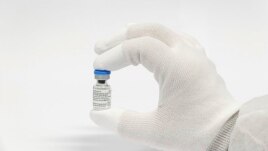27 August 2023
American food and drug officials recently approved the first RSV vaccine for pregnant women. The drug will inoculate the fetus and provide protection from the dangerous lung disease at birth.
RSV stands for respiratory syncytial virus. RSV cases fill hospitals with wheezing babies every fall and winter. Pfizer's newly approved vaccine will mean babies can be protected against RSV at birth. Experts say this will guard against severe RSV infections when babies are most vulnerable — from birth through 6 months.
The drug is named Abrysvo. The Centers for Disease Control and Prevention must issue guidelines, or recommendations, for use of Abrysvo during pregnancy.

This image provided by Pfizer shows the RSV vaccine. U.S. regulators on Monday, Aug. 21, 2023, approved the first RSV vaccine for pregnant women so their babies will be born with protection against the scary respiratory infection. (Pfizer via AP)
"Maternal vaccination is an incredible way to protect the infants," said Dr. Elizabeth Schlaudecker of Cincinnati Children's Hospital in Ohio. Schlaudecker was among the researchers in Pfizer's international study of the vaccine. If shots begin soon, she said, "I do think we could see an impact for this RSV season."
RSV is a minor sickness for most healthy people but it can be life-threatening for the very young. It swells babies' airways, making breathing difficult. It can also lead to the disease pneumonia. In the U.S. alone, the disease leads to hospital stays for between 58,000 and 80,000 children under the age of 5 each year. It kills several hundred a year.
Last year's RSV season was bad in the U.S. It began sickening young children in the summer, far earlier than usual.
Babies are born with an under-developed defense system. They depend on their mothers for disease protection in the first few months after birth.
Here is how the RSV vaccination treatment will work: A single injection late in pregnancy gives enough time for the mother to develop antibodies. These pass to the fetus and are ready to work at birth.
It is the same way pregnant women pass along protection against other infections. Pregnant women have long been urged to get flu and whooping cough vaccines, and more recently, COVID-19 shots.
Pfizer's study included nearly 7,400 pregnant women and their babies. Maternal vaccination did not prevent mild RSV infection. However, it proved 82 percent effective at preventing a severe case during the first three months after birth. At age 6 months, it still was proving 69 percent effective against severe sickness.
Vaccine reactions were mostly tiredness and pain at the site of injection. In the study, there was a small difference in early birth — just a few weeks early — between vaccinated moms and those given an inactive shot. Pfizer has said that outcome was due to chance. The FDA said to avoid the possibility of early birth, the vaccination should take place between 32 weeks and 36 weeks of pregnancy. The researchers vaccinated the study patients a few weeks earlier in the process.
If enough pregnant women get vaccinated, Pfizer predicts the U.S. could prevent as many as 20,000 infant hospitalizations a year and 320,000 doctor visits.
The only other way to guard babies from RSV is to give them lab-made antibodies. The U.S. Food and Drug Administration also recently approved a new drug for all infants younger than 8 months. Called Beyfortus, it is a single dose treatment given before a baby's first RSV season. Sanofi and AstraZeneca made the drug, which is supposed to be available this fall.
Schlaudecker, the Cincinnati Children's Hospital doctor, predicts that doctors will try a combination of the treatments when they become available.
Another Cincinnati Children's Hospital doctor volunteered to take part in Pfizer's vaccine study when she became pregnant. Dr. Maria Deza Leon has cared for seriously sick RSV patients in her work.
"The last thing a parent wants to see is their kid struggling to breathe," she said. "I was also at risk of being the person that could get RSV and give it to my son without even realizing."
Deza Leon received her shot in late January 2022 and her son Joaquin was born the following month. The doctor has not yet learned if she received the vaccine or the inactive shot. However, Joaquin is a healthy little boy who has never had a confirmed case of RSV.
I'm Caty Weaver.
The Associated Press reported this story. Caty Weaver adapted it story for VOA Learning English.
__________________________________________________
Words in This Story
inoculate — v. to introduce material (as a vaccine) into the body especially by injection to protect against or treat a disease
wheeze — v. to breathe with difficulty usually with a whistling sound
vulnerable — adj. open to attack or damage
incredible — adj. extraordinary
impact — n. a forceful effect
dose — n. the measured amount of a medicine to be taken at one time